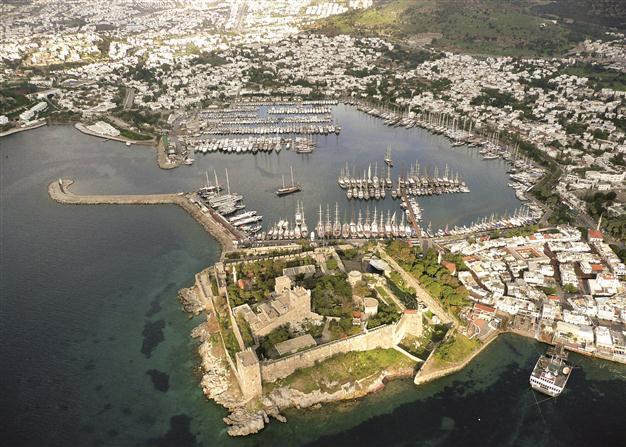Draft ready for property sales to foreigners
Göksel Bozkurt

The Aegean town of Bodrum is a popular spot for foreigners to buy property. The government is preparing a draft law to ease the process of property sales. Hürriyet photo
A legal provision introduced in 2003, enabling real people and corporate entities of foreign origin to obtain real estate in Turkey, was overturned by the Constitutional Court in 2005. The sale of properties to foreigners skyrocketed during those two years. The rationale for the Higher Court’s decision to annul the provision was justified through “the country’s unity, security and its strategic position.”The citizens of nearly 42 countries are not allowed to obtain real properties in Turkey due to the fact that current laws require “reciprocity.” Among these, countries of the Persian Gulf rank at the top, including Qatar, United Arab Emirates, Saudi Arabia, and two countries that have figured rather prominently on the international scene as of late, Syria and Libya, in addition to the Turkic republics of Central Asia.
Prime Minister Recep Tayyip Erdoğan has been showered with regional attention since the advent of the “Arab Spring.” This popularity also has the effect of pushing Turkey and its bountiful geography to the fore. The government now intends to attract a significant influx of direct foreign investment by taking advantage of these regional developments, selling property to foreigners without any regard for the principle of reciprocity.
The Ministry of Environment and Urban Planning has completed its preparations and the draft proposal is expected to be presented to the Cabinet. Minister Erdoğan Bayraktar resolved the issue through the “bypassing” method. The principle of reciprocity stipulated the law will be revoked and the power of authorization, in turn, will be granted to the Cabinet which then will be able to issue permits to any foreign citizen it desires. Reports indicate that problems faced by commercial enterprises bearing a foreign corporate identity will also be dealt with through the same amendment.
I have heard that the draft outline laid special emphasis on the “condition not to issue sales in places that bear strategic significance in accordance with Turkey’s interests.” Lands in vicinity of military zones, power stations, major industrial facilities, airports and other similar strategic areas will not be put on sale to foreign citizens.
The government of the Justice and Development Party (AKP) is expecting to collect earnings on a significant scale as a result of this measure. I do not know the extent to which it would be realized, but they are expecting the appreciation of the value of real properties in certain areas, reductions in unemployment and the development of these regions.
“Countries with self-confidence in the world allow for sales to be issued without seeking the pre-condition of reciprocity. [Sales can be issued without seeking reciprocity] in the United States, Britain and Europe. Turkey has also become a self-confident country. We ought to make it substantially easier for foreigners to buy property,” Minister Bayraktar tells his close circle in defense of the draft proposal.
That is what the government wants, but the main opposition People’s Republican Party (CHP) and the Nationalist Movement Party (MHP) cold shoulder the idea. They argue that such a measure would hamper “the defense of the country’s interests,” and that “the government will be reducing the deficit by selling land to foreigners, as they earlier did through privatization.”
It seems apparent that yet another row is going to break out in Parliament following the end of budget talks.
'Compulsory process could stir the region'
A variety of courts have issued compulsory processes for Şerafettin Elçi, the leader of the Participatory Democracy Party (KADEP), Ahmet Türk and Aysel Tuğluk, who were all rendered independents after the political prohibitions they were subjected to, as well as Peace and Democracy Party (BDP) deputies Altan Tan and Sabahat Tuncel. These deputies have consequently accepted the service of summons. The first trial will be held in the southeastern province of Diyarbakır for deputy Altan Tan on Dec. 14. If Tan refuses to go by advancing his Parliamentary immunity, then the compulsory process will be applied. Some BDP members we spoke to warned “it would escalate tensions in the [southeastern] region if a deputy elected by the national will was brought to court by the police through the use of force” and suggested that the “urgent democracy package” be taken into consideration by Parliament for a solution to be found. BDP leader Selahattin Demirtaş had also indicated earlier that deputies could also be arrested due to charges linked to the Kurdistan Communities Union (KCK). The heat will be on through the month of December as well, it seems. And unpleasant scenes could erupt once more unless Parliament takes precautions
Tour of Anatolia for the constitution!
Parliament’s Constitution Conciliation Commission has formed three subcommissions. A single deputy each from the AKP, CHP, MHP and BDP serves on the subcommissions which are to lend an ear to constitutional institutions, religious communities and associations. Commission members who have already begun taking both written and orally expressed views from relevant institutions and establishments will be moving out of Parliament in the new year. Commission members will tour Anatolia to receive contributions from the field by holding regional meetings. The commission’s task seems rather difficult in these meetings, in view of the constitutional proposals that have been showering upon them.











